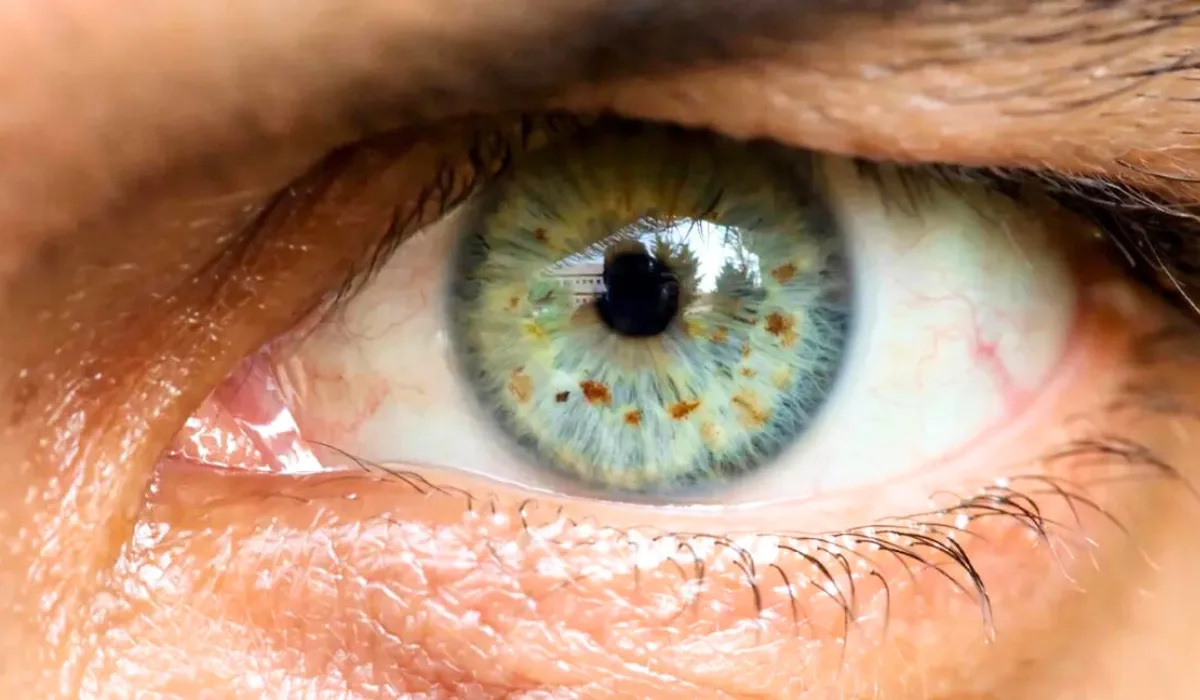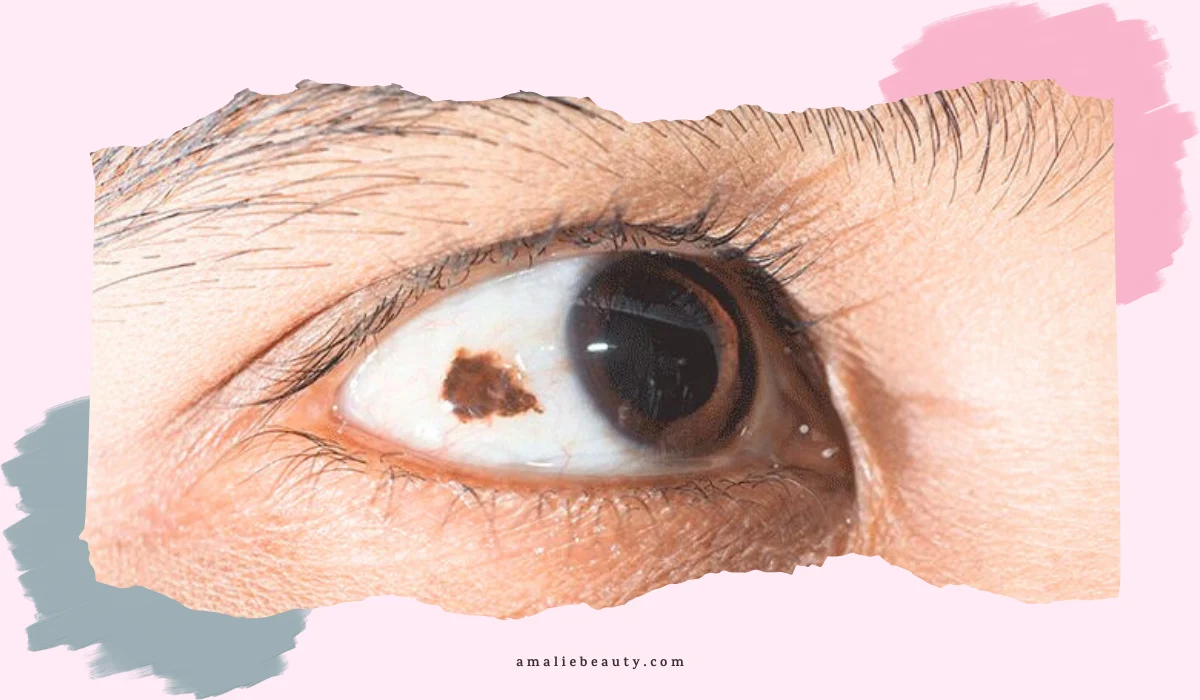Brown spots on the eyes affect 5-10% of the population. They often prompt questions about their nature and causes. The primary culprit behind these spots is usually a choroidal nevus, called ‘eye freckles.”
Brown spots in the eye are usually harmful, but we must understand their types and causes. This is essential for eye health.
This article explores brown spots in the eyes, their causes, and symptoms. It will also look into the natural ways to remove brown spots from the eyes and explain the importance of seeking medical advice in certain cases.
What Are Brown Spots In The Eye?

Brown spots in the eye, known as nevi, form when melanocytes, the pigment cells, group together. This is like how the skin gets freckles or moles. These cells also give color to our hair, skin, and eyes. Commonly, melanocytes are spread evenly, but they become noticeable when they cluster.
Some people have eye freckles from birth. At the same time, some get it from UV light. However, the reason for melanocytes clumping in others isn’t fully understood. Generally, a brown spot in the eye is just a harmless mole. However, on rare occasions, it might indicate ocular melanoma, a form of eye cancer.
Types Of Spots In The Eye
Dark spots in the eyes can be of various types, including:
Moles (Nevi): Benign pigmented spots, similar to moles on the skin.
Freckles (Ephelis): Small, harmless pigmented spots.
Pigmented Conjunctival Lesions: Spots on the conjunctiva, often benign.
Hyphema: Blood pooling in the eye, appearing as a red or dark spot.
Foreign Bodies: Small objects or debris in the eye, appearing as dark spots.
Ocular Melanoma: A rare, malignant tumor that can appear as a dark spot.
Retinal Detachment: This may cause dark floating spots or shadows in vision.Hemorrhage: Bleeding in the eye, leading to dark or red patches.
Causes
Eye freckles happen when melanocytes, the cells that give color to your hair, skin, and eyes, form nevi in the eye. Genetics, sun exposure, and some diseases can cause eye freckles. Though usually harmless, these spots can rarely turn into conjunctival melanoma, a severe eye condition. Besides, Those with darker skin have more melanin and may get more eye freckles.
Symptoms of Brown Spots in the Eye
Brown spots on the eye, like nevi, often have no symptoms. You might only see them when looking in a mirror.
Early ocular melanoma might not show symptoms. But if you notice any changes in your eyes or vision, see a doctor.
Possible signs of brown spots in the eye include:
- Changes in pupil size or appearance
- Eye enlargement.
- Changes in eyeball position.
- Growing dark spot on the iris.
- Seeing floaters or flashes.
- Blurry or partial vision loss.
Diagnosis
They’re usually found during a routine eye exam, as they don’t often have symptoms.
Your doctor might use a special camera to look for abnormal spots.
If they find a nevus (a brown spot), you might see a specialist for further tests like a fluorescein eye stain test, which helps find eye issues.
Sometimes, a biopsy is done. This means taking a small tissue sample from the spot to check if it’s harmless or not.
How do I get rid of brown spots in my eyes?
While it’s not possible to naturally remove brown spots in the eyes, as they are typically caused by pigmentation or specific eye conditions, there are several strategies to manage and possibly prevent further development of these spots:
Sun Protection for Your Eyes: Wear Sunglasses: Select 10% UVA and UVB sunglasses. This assists in preventing UV rays from causing additional pigmentation changes that may result in more spots.
Wear a Hat: An umbrella can also add more sun protection.
Eat an Antioxidant-Rich Diet: Eat foods high in antioxidants. These include leafy greens, berries, nuts, and seeds. They can support eye health.
Omega-3 fatty acids foods loaded with omega-3s, like fish, flaxseed, and walnuts, are known for supporting eye health.
Drink Water: Drinking water and staying hydrated is important for the health of all body tissues, including the eyes.
Follow the 20-20-20 Rule: Every 20 minutes, take a 20-second break to look at something 20 feet away to reduce eye strain.
Proper Lighting: Ensure adequate lighting while reading or working to avoid straining your eyes.
Professional Monitoring: Regular check-ups with an eye specialist are vital. They can monitor the brown spots’ size, shape, and color and check for any signs of concern.
Early Detection: Regular exams can help detect changes early. These changes might need medical help.
Medical Treatment To Remove Brown Spot from The Eye
For a brown spot in the eye: If it’s a nevus (like a mole), doctors usually watch it over time to ensure it doesn’t change or grow. It might be removed if it’s not cancer and affects how the eye looks.
For ocular melanoma, a type of eye cancer, treatment is often needed. Small melanomas may be monitored at first. Treatments include radiation or surgery. Radiation might involve a special disk near the tumor or external beams.
Sometimes, specific drugs are used for treatment.
Surgery can mean removing part of the eye and, rarely, the whole eye.
When To See a Doctor?
Seek medical advice promptly if you observe a brown spot on your eye. The eye care professionals will monitor it regularly to determine if it’s an eye freckle.
Although rare, there is a small chance that an eye freckle could develop into cancer. Ocular melanoma, a type of cancer, is unlikely to manifest as a brown spot. If tests indicate cancer, your doctor will work with you. You will make a treatment plan together.
Wrap Up
Brown spots in the eyes, often harmless, are like skin moles. While they can’t be removed naturally, you can manage them. Guard your eyes from the sun, eat a healthy diet, and keep hydrated. Regular eye check-ups are important. If these spots change, they might need medical treatment, like surgery or radiation. Do not forget to seek medical advice if you notice any changes in your eye.

